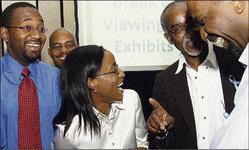
Earl Jarrett (right), chairman of the Jamaica Cancer Society, shares a joke with (from left) Dr. Richard Mayhew, consultant urologist; Dr. Leroy Morrison (in background), urology resident; Dr. Belinda Morrison, urology resident; and, Dr. Trevor Tulloch, president of the Jamaica Urological Society. Occasion was the prostate cancer public forum held at the Jamaica Pegasus hotel, yesterday. - Rudolph Brown/Chief Photographer
Dr. Trevor Tulloch, president of the Jamaica Urological Society, is urging Jamaican males to be more proactive about their health.
This, as Jamaica continues to record high rates of prostate cancer.
"Read more, learn more and ask more questions so that you may stand on good ground in making decisions about your health," Dr. Tulloch said.
"Getting accurate, understandable information is easier to come by these days through books, newspapers and of course, through the Internet."
Dr. Tulloch was addressing a public forum on prostate cancer organised by the Jamaica Cancer Society and the Jamaica Urological Society. The forum was held at the Jamaica Pegasus hotel, New Kingston.
Dr. Tulloch noted that a few years ago it was estimated that the ratio of females to males seeking breast and prostate cancer screening respectively, was 40:1.
Fear factor
"This brings me to the fear factor - fear of the digital rectal examination (DRE)," he said. "I never quite understood it, but in all my years of practice, I am yet to come across any individual who was made a homosexual from having a DRE."
He said the second fear patients have is that their sex life might be affected and that the diagnosis of prostate cancer might equate to a death warrant.
"The fact is that a delay in diagnosis could make your worst fears come true," he told members of the audience. "Like any other member of your body, your prostate is important. Take care of it; get it checked annually."
Earl Jarrett, chairman of the Jamaica Cancer Society, said urgent steps needed to be taken to reduce the number of deaths from the disease.
"The unfortunate reality is that the country cannot afford the economic and social cost of late-stage diagnosis of prostate cancer," he pointed out.
According to Jarrett: "The impact of the disease on families and the economy can be greatly relieved if both the patient and the country take positive actions to achieve early diagnosis and access to treatments."
The World Health Organisation reports, that next to heart disease, prostate cancer is the leading cause of death among black men in the United States, Canada, the United Kingdom and the Caribbean.

